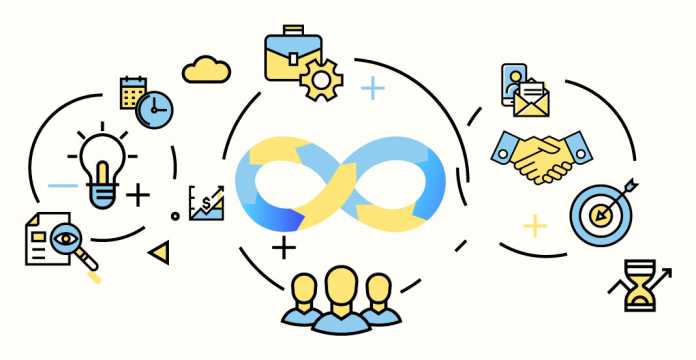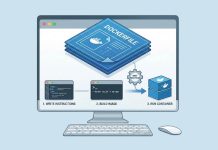
While there are multiple DevOps tools that help companies during Requirements Gathering, Development, Testing, and Deployment, there are numerous tools that companies need to invest in to enable team members to collaborate and communicate with each other seamlessly.
These tools enable team members to get an in-depth understanding of the tasks being carried out, as well as to stay on track with the schedule.
In this article, we have covered the top nine tools which help team members collaborate efficiently while adopting DevOps.
1. Rational DOORS Next Generation (DNG)
IBM Rational DOORS Next Generation, previously known as Telelogic DOORS, can be classified as a Requirements Management tool that is used to optimize communication, collaboration and also verification of demands. It takes the requirements first and then tracks all the changes made, and ensures they are complying with all the rules and standards. Additionally, project scope management can easily be updated and tracked with the use of DOORS Next Generation.
Advantages of Rational DOORS Next Generation (DNG):
- You can keep track of all the requirements, changes in those requirements and the status of the changes.
- It performs compliance administration towards all the regulations and standards of requirements group method
2. Rational Team Concert (RTC)
IBM’s Rational Team Concert (RTC) is an excellent tool that controls skills like planning, outlines, statuses and also collaborative innovation management. Versatility towards method adaptation is one of the most significant traits that RTC provides for companies’ to decide on their release cycles and dependencies.
Advantages of Rational Team Concert (RTC):
- Rational Team Concert (RTC) is configurable and therefore can be customized to match your processes
- Another significant advantage in applying RTC is it works as a Rational Requirements Composer and also Rational Quality Manager.
3. Bitbucket Server
Atlassian’s Bitbucket Server is a mixture of GIT server and a web interface product. It is usually used as a web-based hosting solution that is targeted for plans which use either Mercurial or GIT version control methods. This tool is specially produced for professional teams, as it not just allows users to code but also to maintain and collaborate on GIT schemes.
Advantages of Bitbucket Server:
- BitBucket gives a disseminated control system that promotes collaboration between the team members and also allows extensive scaling.
- BitBucket also claims to provide unlimited private and public repositories.
4. Pivotal Tracker
A pivotal Tracker is a Software as a Service (SaaS) product that is aimed toward Agile Project Management and also for collaboration. It is a user-friendly, story-based project management application that is fitting for software development units to work together in agile projects. It is built based on proven Agile methods, which is obtained from experience on thousands of large-scale commercial software development projects.
Advantages of Pivotal Tracker:
- Pivotal Tracker is created to help companies in developing better software instantly by optimizing the collaboration process and assisting teams in identifying priorities quickly.
- Clear and valid lines of information that encourage team members to share their matters and documents of any type with other members are provided by this tool.
5. Atlassian Confluence
Confluence, a contribution from Atlassian, is a Content and Team Collaboration software that gives a new approach for modern teams to run together. With this tool, you can build, share and even collaborate on projects. Additionally, you can easily publish and organize company information at a central location.
Advantages of Atlassian Confluence:
- Confluence is a content-based program that encourages teams to build and share knowledge amongst coworkers which is required for the work to be done at a faster pace.
- Atlassian provides an SSO feature, using which you can enter your JIRA content in Confluence, thereby drawing a perfect picture of your development methods to the stakeholders.
6. Atlassian JIRA
JIRA from Atlassian is an excellent Project Management software, and at the same time, it can also be a powerful collaboration tool for an organization. It is a tool designed uniquely to discover, assign and prioritize tasks for the improvement of project execution. JIRA is the most trusted tool that is used in the areas of collaboration and also Project Management by the likes of Spotify, eBay, Cisco, and even LinkedIn.
Advantages of Atlassian JIRA:
- JIRA, a flexible method that can fit in any of the corners or industries, has evolved as an extremely configurable and customizable product over the years.
- JIRA is an active source of all your Project Management doubts and can also act as a piece of regulatory confirmation at every stage of the whole method.
7. Microsoft Teams
It’s a chat-based workspace from Office 365, which allows associates of a company to be in touch with everyone and build required collaboration and connections as needed. This tool has a unique characteristic of maintaining private group and channel-based conversations among their coworkers to maintain privacy, instill security and keep knowledge intact.
Advantages of Microsoft Teams:
- The feature of communicating and collaborating with other team members in real-time is unbeatable with Teams.
- It ensures that all the participants are on the same page rather than breaking conversations over emails or other communication methods.
- Teams is available in over 18 languages as of now, and this is going to develop in the future.
8. Slack
Be it a development space or for social gatherings, Slack is the poster child for all modern-day collaborations, the functionality implemented by Slack itself. One of the main driving forces of this tool that any company would love to have is transparency.
Advantages of Slack:
- Teams can establish communications via multiple channels for groups and/or individuals
- They can send messages, make audio/video calls and do everything from one platform
9. Basecamp
In a nutshell, Basecamp is known for its chat feature and threaded chat message board, however, features like to-dos and the calendar have gained immense popularity as well. These features are formed into a perfect collaboration medium, making Basecamp one of the most used project management tools.
Advantages of Basecamp:
- Organizing plans and communication flows seamlessly with the to-do functions/lists, schedules, and chats.
- You can easily browse all relevant communication and data from one place.
- With its open API, you can design your own 3rd party integrations as well.
When a company attempts to bring both the development team and operations team together, there are bound to be miscommunications. These tools can help you drastically reduce risks that arise from a lack of communication and ensure your team members are on the same page at all times. Incorporating DevOps can be a complex mechanism for an organization. Individuals and enterprise teams need to get additional knowledge across various DevOps certification courses to gain in-depth knowledge of DevOps in an enterprise context and to better use the above-mentioned DevOps collaboration tools.
Some of the popular DevOps certification courses that individuals and enterprise teams can take up are:
- DevOps Professional Certification Course














